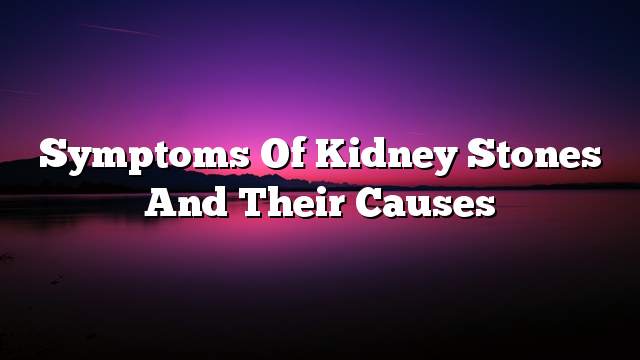kidney stones
Kidney stones are defined as small solid metal deposits that are formed inside the kidney and are made of salts and mineral acids. The person gets kidney stones when the urine contains many substances that he can not dissolve, such as calcium and uric acid. At the same time, urine is free. Of the materials that prevent the crystals from sticking together, creating an environment conducive to the formation of kidney stones.
Symptoms of kidney stones
The symptoms of kidney stones begin to appear when the stones are stuck in the kidney, and move towards the bottom of the ureter, and when the person suffering from kidney stones inflammation, and in those cases show one of the following symptoms:
- Persistent pain in the lower back area, which may sometimes reach the groin, may affect the testicles and scrotum for men.
- Frequent periods of severe pain in the back, abdomen or thighs sometimes occur, lasting for minutes or hours.
- Not being able to stay in one position or not being able to lie down and steadfastness.
- Feel nausea.
- Feeling the need to urinate more than usual.
- Pain when urinating, and the presence of blood in it; which is caused by scratching the stone of the kidney or ureter.
Causes of kidney stones
Most of the time there is no definite cause of kidney stones, but there are some factors that cause such as:
- Family or personal history: Family history means heredity. If there is a person in the family who has kidney stones, the person is more likely to be infected. Personal history means that the person is infected with one or more times, but there is a risk of recurrence.
- Drought: Not drinking enough water a day increases the risk of infection, so we see that people living in warm areas and people with high sweat are more likely to get stones for others.
- Food Systems: Eating diets high in protein, sodium and sugar increases the risk of kidney stones, because sodium increases the amount of calcium that the kidneys should filter.
- Obesity: A higher body mass index (BMI) and an increase in waist circumference than normal increases the risk of stones.
- Diseases of the digestive system: Include enteritis, chronic diarrhea and other changes in the digestion process that affect the absorption process of calcium and water.
Treatment of kidney stones
- Drink plenty of water to two liters to three liters a day to wash the urinary system.
- Take sedative medications as instructed by your doctor.
